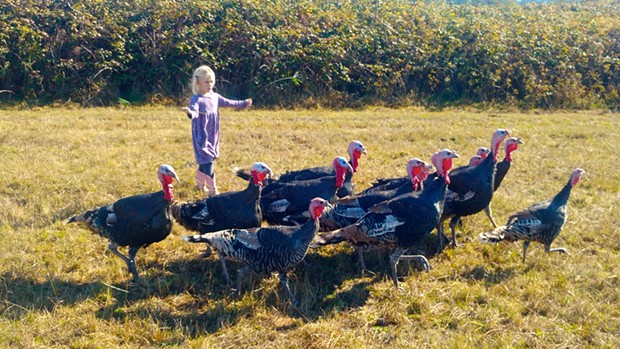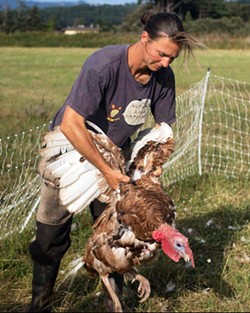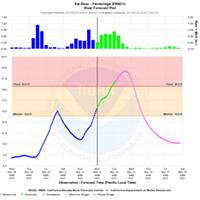Slow Turkey
Tule Fog Farm's pasture-raised birds
By Jennifer Fumiko Cahill [email protected] @jfumikocahill[
{
"name": "Top Stories Video Pair",
"insertPoint": "7",
"component": "17087298",
"parentWrapperClass": "fdn-ads-inline-content-block",
"requiredCountToDisplay": "1"
}
]
As word of a rising prices and a potential turkey shortage spreads, some cooks planning Thanksgiving dinner are snapping up stone-frozen birds or planning alternative centerpieces for the meal. According to the New York Times, the cost of some whole turkeys has already jumped 25 cents per pound. At Tule Fog Farm in the Arcata Bottoms, the large, red-wattled birds are still wandering the field, eating grass and pecking at bugs and worms.
Shail Pec-Crouse has owned Tule Fog Farm since 2008 and also raises pigs, chickens, goats, ducks, bees, cows and sheep on its less than 30 acres. They hadn't heard of the national price and availability issues but, despite running a very different operation from factory farms, they're feeling similar impacts in terms of shipping problems and rising grain prices. In fact, this year's Thanksgiving harvest of some 25 to 30 birds is likely their last.
At first, raising livestock for meat would seem an unlikely path for Pec-Crouse. "I was a vegan interested in food politics," they say. "I was an environmentalist, and was attending [Humboldt State University] and started learning about alternative farming methods."
Those alternatives were focused on both ecology and humane treatment of animals. Their partner at the time was also vegetarian but frequent "hangry-ness" made him return to eating meat. The two found the most ethical way to incorporate animal protein was with local grass-fed beef, since it requires surprisingly little fossil fuel, even in comparison to beans and soy products grown in, say, Idaho, which require shipping and tractor-powered tilling and fertilizing.
Also, they note, "Grass-fed cattle lead a pretty happy life compared to factory animals."
With one semester left at HSU, their partner got involved in brainstorming the best use of some land with local farmers, who came up with an organic poultry operation. Pec-Crouse jumped in on the proposed chicken, egg and broiler farm. "I felt like I could do it in a much more environmentally sustainable way than factory farming," they say. The eggs they brought to the Arcata Farmers Market were twice the price of organic eggs at local stores but still sold out. Market patrons, it seemed, had an appetite for local, organic eggs from pasture-raised chickens that weren't confined in dark, crowded warehouses with their beaks removed, as factory-raised birds typically are. "They're only worth it if you care about the animals you eat living a decent life."
"I wanted to be a grass-based farmer because we grow grass in Humboldt County," says Pec-Crouse. They would be up for local grain feed for birds but it's typically farmed for people to eat and not priced for livestock. So Pec-Crouse supplements their poultry's diets with domestically grown organic grain. They say it would be great to only raise geese on grass feed and get lovely, large eggs three months out of the year, "But my family was unwilling to only eat eggs seasonally."
Broad breasted turkeys, like your average Butterball or other supermarket variety, "are an amazing, beautiful feat of breeding," says Pec-Crouse. A broad breasted turkey can grow to 20 pounds in three months. Pec-Crouse, however, raises heirloom turkeys that take twice as long to mature, require more feed per pound and top out around 15 pounds. Crossbreeding a few heirlooms with broad breasted turkeys a few years ago resulted in larger but fewer birds. The upside to the heirlooms is they breed naturally and while that means feeding a breeding flock all year, it eliminates the need to buy factory-born chicks.
That extra feed has made a big difference as the cost of grain has gone up, despite the turkeys' partial grass diet. Pec-Crouse says their feed prices doubled between November of 2019 and November of 2021. Some of that is due to the general increase in grain prices, but also because they can no longer get a trucking company to deliver cheaper bulk orders direct from the mill. "I'm going to have to put my prices up this year, which makes me feel sick," they say. Last year the birds went for $10 per pound but this year they may need to sell for $15. "I hate raising prices."
On top of the cost of feed, the plucker Pec-Crouse has rented in past years isn't available anymore, which means hand plucking with as many volunteers as they can round up for harvest day the Sunday before Thanksgiving.
Tule Fog Farm's breeding flock is already on Craigslist and while Pec-Crouse regrets not being able to provide the birds their customers have enjoyed for years, they won't be too sorry to see the birds themselves go. It's a matter of personality. "They're just little dinosaurs," they say. Once the flock surrounded Pec-Crouse's 3-year-old child and one jumped at her belly, clawing her "just like a velociraptor. ... Biologically, they're like dinosaurs but they act like it, too." Even the one they raised in the house was decidedly unfriendly.
The heirloom and broad breasted turkeys yield similar tasting meat, says Pec-Crouse, "But having them out on grass eating green things, it makes them more flavorful. ... It's very different from what you get in a factory farm."
Pec-Crouse is typically in charge of the stuffing but when it comes to preparing the bird, they swear by a little salt rub under the skin and low and slow cooking — roughly an hour per pound in an oven below 200 degrees. Roasting breast-down eliminates the need for basting the breast as the juices flow downward. "With my birds, it's almost a whole day of cooking" to get to an internal temp of 165 degrees. Still, Pec-Crouse says, like the way they raise their birds, it's worth it.
Reach her at 442-1400, extension 320, or [email protected]. Follow her on Twitter @JFumikoCahill.
Speaking of...
more from the author
-
Journal Welcomes California Local News Fellows
- Jun 27, 2024
-
Best Oyster Goes Pop-up
- Jun 20, 2024
-
A Shell of a Time
- Jun 20, 2024
- More »





































